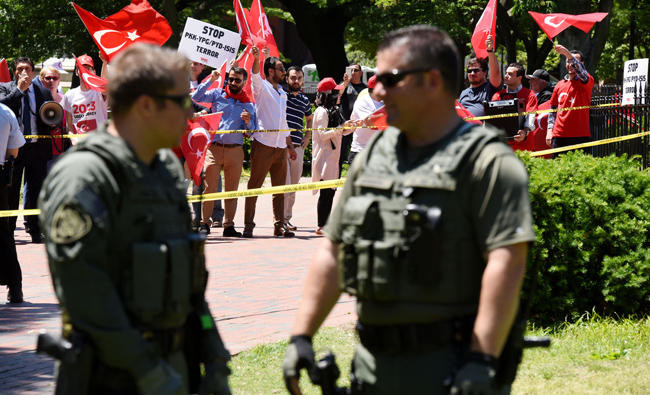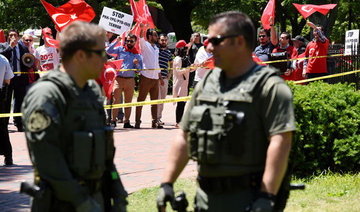ANKARA: Turkey summoned the US ambassador on Monday to protest “aggressive behavior” by American security personnel and “security lapses” during Turkish President Recep Tayyip Erdogan’s visit to Washington last week.
The key visit was marred by bloody clashes that took place outside the Turkish ambassador’s residence after Erdogan met American counterpart Donald Trump.
US officials and police have blamed Erdogan’s bodyguards for the incident, accusing them of attacking a small group of pro-Kurdish protesters gathered outside the building and the incident ignited a storm of controversy.
Witnesses at the scene last week confirmed this account to AFP, and on Monday the US State Department did not back down in the face of Turkey’s complaint.
“We can confirm the Turkish foreign ministry convoked our ambassador to Turkey to discuss the violent incidents involving protesters and Turkish security personnel on May 16,” spokeswoman Heather Nauert said.
“As we noted previously, the conduct of Turkish security personnel last week was deeply disturbing. The State Department has raised its concerns about those events at the highest levels,” she added.
Turkey blamed the violence on supporters of the outlawed Kurdistan Workers Party (PKK) who picked on pro-Erdogan US-based Turks.
The Turkish ministry summoned John Bass, American ambassador in Ankara, to deliver a “written and verbal protest” over “the aggressive and unprofessional actions taken.”
The ministry accused US security personnel of acting “contrary to diplomatic rules and practices... toward the close protection team” of Turkish Foreign Minister Mevlut Cavusoglu in front of the Turkish embassy chancery in Washington.
“It has been formally requested that the US authorities conduct a full investigation of this diplomatic incident and provide the necessary explanation,” it added.
The ministry said it told Bass there were “lapses of security” during Erdogan’s stay.
It hit out at “the inability of US authorities to take sufficient precautions at every stage of the official program.”
However, the ministry said it emphasized to Bass that this would not overshadow an otherwise “successful and important visit.”
US Senator John McCain said that the Turkish ambassador should be thrown “the hell out of the United States of America” after the fighting.
“This is Erdogan’s security detail. Somebody told them to go out there and beat up on these peaceful demonstrators,” McCain said Thursday.
Turkey summons US envoy over ‘security lapses’ in Erdogan visit
Turkey summons US envoy over ‘security lapses’ in Erdogan visit

Israeli military kills Palestinian teenager in occupied West Bank

- Israeli settlers in the West Bank also serve in the army, and sometimes carry their weapons with them when off duty
AL-MUGHAYYIR: Israeli forces killed a 14-year-old Palestinian in the occupied West Bank village of Al-Mughayyir on Friday, the Palestinian Health Ministry said, while the military said soldiers had responded to stone throwing.
The Ramallah-based Health Ministry announced the death of 14-year-old Mohammed Al-Nassan by Israeli fire in Al-Mughayyir in a statement on Friday.
Shortly after, Israel’s military said its forces had come to the village after Palestinians “hurled stones toward Israelis, set tires on fire and blocked access routes to the area.”
The military said dozens of Palestinians were throwing stones upon their arrival, including one who posed “an imminent threat.”
“The soldiers responded by firing warning shots into the air, followed by fire to eliminate the terrorist,” the military said, adding it had set up roadblocks in the area to search for another suspect.
Amin Abu Aliya, mayor of Al-Mughayyir, said that the army raided the village when people began to exit mosques after Friday prayers.
“This young man (Nassan) was exiting the mosque where he was praying with the people, the military vehicle stopped in front of the mosque, they opened the back door and started shooting at him directly,” Abu Aliya said.
Abu Aliya added that following the incident, the army introduced a curfew for the village, closing all shops and setting up a new checkpoint at the village’s entrance.
He pointed to the heavy military presence in his village in recent months, which he said often protected Israeli settlers who recently set up nearby outposts and took land from Al-Mughayyir farmers.
In September, a settler who the military said was an off-duty soldier shot and killed a 20-year-old who the army said had thrown stones in Al-Mughayyir.
Israeli settlers in the West Bank also serve in the army, and sometimes carry their weapons with them when off duty.
Israel has occupied the West Bank since 1967.
Violence there has soared since the Oct. 7, 2023, attack on Israel that triggered the Gaza war and has not subsided despite the truce that came into effect in October.
Since October 2023, Israeli troops and settlers have killed more than 1,000 Palestinians in the West Bank, according to Health Ministry figures.













